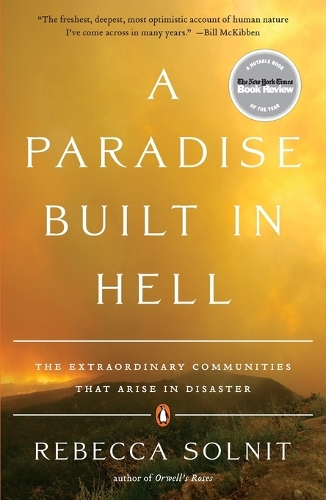
A Paradise Built in Hell: The Extraordinary Communities that Arise in Disaster
Publishing Details
A Paradise Built in Hell: The Extraordinary Communities that Arise in Disaster
By (Author) Rebecca Solnit
Penguin Putnam Inc
Penguin USA
31st August 2010
United States
Classifications
General
Non Fiction
Social, group or collective psychology
Social impact of disasters / accidents (natural or man-made)
303.485
Physical Properties
368
Width 137mm, Height 213mm
Description
"A landmark book that gives impassioned challenge to the social meaning of disasters" (The New York Times Book Review) from the author of the memoirRecollections of My Nonexistence "Solnit argues that disasters are opportunities as well as oppressions, each one a summons to rediscover the powerful engagement and joy of genuine altruism, civic life, grassroots community, and meaningful work."-San Francisco Chronicle Chosen as a Best Book of the Year by the New York Times, Los Angeles Times, New Yorker, San Francisco Chronicle, Washington Post, and Chicago Tribune The most startling thing about disasters, according to award-winning author Rebecca Solnit, is not merely that so many people rise to the occasion, but that they do so with joy. That joy reveals an ordinarily unmet yearning for community, purposefulness, and meaningful work that disaster often provides. A Paradise Built in Hell is an investigation of the moments of altruism, resourcefulness, and generosity that arise amid disaster's grief and disruption and considers their implications for everyday life. It points to a new vision of what society could become-one that is less authoritarian and fearful, more collaborative and local. A New York Times Notable Book Chosen as a Best Book of the Year by the New York Times, Los Angeles Times, New Yorker, San Francisco Chronicle, Washington Post, and Chicago Tribune "A landmark book that gives impassioned challenge to the social meaning of disasters" -The New York Times Book Review "Solnit argues that disasters are opportunities as well as oppressions, each one a summons to rediscover the powerful engagement and joy of genuine altruism, civic life, grassroots community, and meaningful work." -San Francisco Chronicle A stirring investigation into what happens in the aftermath of disaster, from the author of Orwell's Roses The most startling thing about disasters, according to award-winning author Rebecca Solnit, is not merely that so many people rise to the occasion, but that they do so with joy. That joy reveals an ordinarily unmet yearning for community, purposefulness, and meaningful work that disaster often provides. A Paradise Built in Hell is an investigation of the moments of altruism, resourcefulness, and generosity that arise amid disaster's grief and disruption and considers their implications for everyday life. It points to a new vision of what society could become-one that is less authoritarian and fearful, more collaborative and local.
Reviews
Praise for A Paradise Built in Hell:
Everyone feels alone in a crisis . . . It neednt be that way. In fact, as the incomparable Rebecca Solnit has shown throughout her long, meandering, brilliant career, but especially in [this book], it must not be. A Paradise Built in Hell is an eye-opening account of how much hope and solidarity emerges in the face of sudden disaster . . . [These lessons] offer deep comfort now, as antidotes not just to feelings of helplessness but loneliness.
David Wallace-Wells, New York Magazine
[An] expansive argument about human resilience . . . Though Solnit mobilizes decades of sociological research to support her argument, the chapters themselves move effortlessly through subtle philosophical readings and vivid narrations.
The New Yorker
What will it be like to live not on the relatively stable planet that civilization has known throughout the ten thousand years of the Holocene, but on the amped-up and careening planet were quickly creating With her remarkable and singular book, A Paradise Built in Hell, Rebecca Solnit has thought harder about the answer to that question than anyone else. Her answer is strangely and powerfully hopeful. As she proves with inspired historiography, disasters often produce remarkable temporary communitiesparadises of a sort amid the rubble, where people, acting on their own and without direction from the authorities, manage to provide for each other.
Bill McKibben, The New York Review of Books
Thought-provoking . . . captivating and compelling . . . there's a hopeful, optimistic, even contagious quality to this superb book.
Los Angeles Times
Far-reaching and large-spirited.
San Francisco Chronicle
Stirring . . . fascinating . . . presents a withering critique of modern capitalist society by examining five catastrophes . . . Her account of these events are so stirring that her book is worth reading for its storytelling alone. . . . [An] exciting and important contribution to our understanding of ourselves.
The Washington Post
Author Bio
Rebecca Solnit is the author of numerous books, including Hope in the Dark, River of Shadows- Eadweard Muybridge and the Technological Wild West, Wanderlust- A History of Walking, and As Eve Said to the Serpent- On Landscape, Gender, and Art, which was nominated for the National Book Critics Circle Award in Criticism. In 2003, she received the prestigious Lannan Literary Award.
